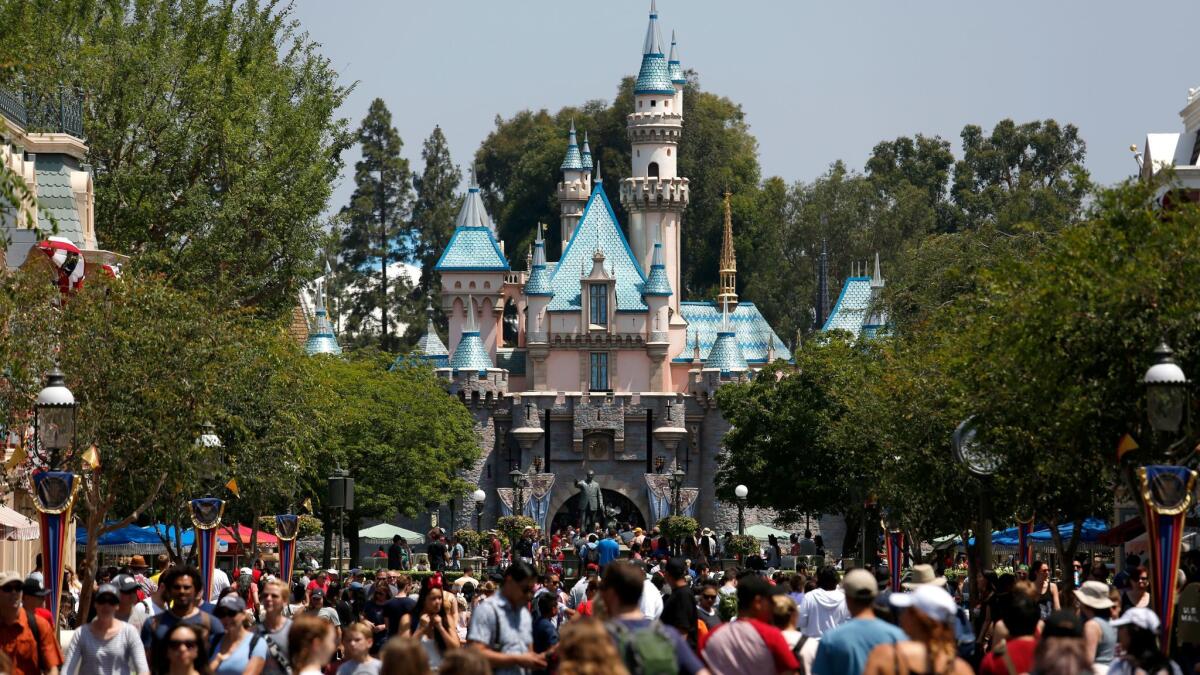Three-quarters of employees surveyed at Disney’s Anaheim resort say they can’t afford basic living expenses

Only weeks after Walt Disney Co. reported better-than-expected profit, a survey at the company’s Anaheim theme parks found that 73% of employees questioned don’t earn enough to pay for such expenses as rent, food and gas.
The online survey, funded by labor groups pushing for higher wages for workers at Disneyland and California Adventure Park, also said that 11% of resort employees have been homeless or have not had a place of their own in the last two years.
“Disneyland employees report high instances of homelessness, food insecurity, ever-shifting work schedules, extra-long commutes, and low wages,” the study said.
Disney called the survey inaccurate, noting that it was only offered to union workers at the resort and claiming there were no controls preventing disgruntled employees from answering multiple times.
“This inaccurate and unscientific survey was paid for by politically motivated labor unions and its results are deliberately distorted and do not reflect how the overwhelming majority of our 30,000 cast members feel about the company,” park spokeswoman Suzi Brown said.
The union responded to Disney’s critique, saying it required the union workers taking the survey to provide their membership number to ensure none responded more than once.
The online study was conducted by the Economic Roundtable, a nonprofit research organization in Los Angeles, and the Urban & Environmental Policy Institute at Occidental College.
It was underwritten by a coalition of nine labor groups that represent workers at the two parks. Three of those unions are now negotiating contracts with Disney and other unions are scheduled to begin talks in the next few months.
The study cited Disneyland hair and makeup artist Rebekah Pederson, who describes herself as homeless and a Type 1 diabetic.
“I’m a licensed professional whose position requires years of experience yet my wages are so low I often have to choose between food and a roof over my head,” she said in a statement.
The study concluded that the average wage for Disneyland Resort workers when adjusted for inflation dropped 15% from 2000 to 2017, from $15.80 to $13.36.
Disney officials challenged the figure, saying the annual salary for hourly workers at the resort is $37,000, which calculates to about $17.80 per hour. Theme park officials also said employees can seek help for financial problems, child-care issues and other matters through a company program called LifeCare.
Critics of Disney and its Anaheim theme parks say the entertainment giant has the resources to pay workers higher wages.
Earlier this month, Disney raised ticket prices as much as 18%, with one of its most expensive annual passes selling for $1,149 for its two Anaheim parks. The hike came only days after the Burbank media and entertainment company reported net income of $4.42 billion for the quarter that ended Dec. 30, thanks partly to a federal tax cut. The profit represented a 78% increase over the same period a year earlier.
Following approval of the new tax reform bill, Disney promised $1,000 bonuses to each of its 125,000 employees. But the company is holding back the bonuses for hotel workers at theme parks in Anaheim and Orlando, pending the resolution of contract negotiations that have been going on for more than a year.
The unions representing the hotel workers have filed complaints with the National Labor Relations Board, accusing Disney of using the promised bonuses as a bargaining chip in the negotiations.
To read more about the travel and tourism industries, follow @hugomartin on Twitter.
More to Read
Inside the business of entertainment
The Wide Shot brings you news, analysis and insights on everything from streaming wars to production — and what it all means for the future.
You may occasionally receive promotional content from the Los Angeles Times.










